TrekCore talks to Robert Meyer Burnett, one-half of the talented duo responsible for the creation of the new bonus features on Star Trek: The Next Generation‘s remastered Blu-Ray releases. Normally to be found beavering away in his edit bay, Rob generously took several hours out of his busy schedule to talk to me about all things Star Trek, answering questions about his work and dropping several juicy hints about the exciting things he and Roger Lay Jr. have planned for future Star Trek Blu-Ray releases.
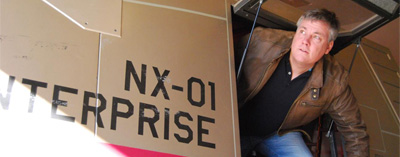
Robert Meyer Burnett: Who Interviews the Interviewer? Part 2
Interviewed by Adam Walker for TrekCore.com
![]()
TrekCore: From a special features perspective, the DVD release of The Next Generation – which was 10 years ago now – at the time was fantastic, it was our first real look behind-the-scenes of the series. However looking back and rewatching those documentaries and comparing to the material we’re seeing on the Blu-Rays, so much of it comes across as superficial fluff. What were your reactions to the DVD Bonus features when you saw them?
Robert Meyer Burnett: I’ve always felt that Star Trek, across the board, has been very underserved by the VAM that’s been produced. A lot of that was because of the studio itself – they were always worried about things, and the actors, and people being compensated, and getting upset… there’s been a lot of tumult over the years – but also, the people that were doing Star Trek [DVDs], they did the best they could, but they didn’t KNOW Star Trek. They knew it from a superficial level, like they knew what shots had the most bang for their buck… everyone knew that, okay, you can get battle scenes from “The Best of Both Worlds” and you can go to “Yesterday’s Enterprise” or whatever. The problem was, they didn’t have – we’re filmmakers. Both Roger and I have made films, and we’re coming at it from – and I’ve been doing DVD special features for a long time, and I always approach them as a movie itself. Like, I’m trying to tell a story – the real story – of something. I already know Star Trek so well – it’s been a lifelong obsession of mine – I’m not interested in doing some kind of a fluff piece, because you don’t learn anything. What I’m trying to do, ultimately, is trying to find something that’s new and unusual, that I don’t know. Or, at least, be able to convey emotion.
One of the things that I’m very proud of is that – because I conduct all the interviews with everyone myself – I’m able to get much more candor from them because I’m not asking them questions like… I asked Patrick Stewart right before I interviewed him, “Patrick, what do you really know about ‘Star Trek’?” He said, “What do you mean?”
I said, “What do you KNOW about it? If I were to ask you about the geopolitical situation that exists between the Klingons and the Romulans, what did the Duras sisters do during the Klingon civil war between ‘Redemption I’ and ‘Redemption II’ or whatever, what would you know?” He was like, “I don’t even know what you just said.” (Laughs) I said, “Exactly! Nobody cares about that! The fan base already knows way more about ‘Star Trek’ from that perspective then you ever will – what people want to know about is who YOU are. What was it like for you, Patrick Stewart as an actor, to come over and the very first time you stepped foot on a Hollywood soundstage was when you did ‘Star Trek’? How did you feel about that? What was that like for you?”
That’s what people want to know. I think that when people see celebrity interviews, they don’t want to hear “Tell me about your character.” We already know about their character. We watched the show; we get it. You don’t have to tell me who Captain Picard is. I know Captain Picard as I watched for seven years and I’ve seen four feature films. I get it, man. I want to know what was it like for Patrick Stewart, as an actor from the RSC, what was it like to play this part on these wacky sets with this costume on, and suddenly go to conventions… how did YOU feel about that? That’s how I approach all of the VAM. What’s it like for you, as a person? I think that’s what I’m most proud of; the work Roger and I do. I mean, wait ‘til you see what Roger’s been doing on Enterprise! I mean, oh my god! The candor there has been ASTONISHING.
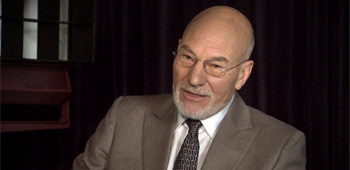
When interviewing Patrick Stewart, Robert Meyer Burnett avoided clichéd questions about Stewart’s character which the actor has answered a dozen times and instead discussed Stewart’s personal experiences shooting the show.
TrekCore: Sometimes I assume you have to tread a very fine line between celebrating Star Trek – which this project is supposed to be doing – and producing an honest retelling of the show from behind-the-scenes. Like a lot of shows, Star Trek‘s production has periods of its history which are troubled and full of strife. How do you go about covering those and getting a balance?
Robert Meyer Burnett: Well, it’s tough, you know, for any creative endeavor there’s always strife. With Star Trek, you have people like David Gerrold and Dorothy Fontana who hold Star Trek up as sacrosanct and almost holy, in a way. They were thrown into a situation where they thought they were going to recreate this show… the problem is, it’s one thing to have the best intentions, but when you’re dealing with a show and you’ve got an executive like Rick Berman coming in – and Rick Berman’s position at Paramount was tenuous at best, I mean, he was getting phased out, and he was on this show that was never going to work, you know, his career depended on whether Star Trek was going to work – and then you had Gene Roddenberry, who was not exactly the most fiscally responsible of executives, wanting to protect his legacy. There was so many things going on, and so many forces at work that were not conducive to one another – I mean, yes, everybody wanted to make a TV show, but there’s a reason why fans have such a difficult time breaking into the professional area of the business, because it’s a very different thing. If you’re a fan, it’s hard for you to be a professional because you think as a fan thinks, and you’re not thinking with the realities of what it takes to make a show on a daily basis.
There are many writers, especially on the first three seasons – as Ira Behr talks about it in the third season documentary, the third season was a fucking nightmare. He says, “Boy, I wish somebody told me then that the third season was going to be looked as this great watershed moment, because when we were doing it, it was a NIGHTMARE.” That’s part of what the third season documentary is all about.
A lot of people vilified Rick Berman at the time – fans, and also the writers, because he would just kill things out of hand. But from his perspective, he was trying to keep this new TV show on the air. Any talk of this old throwback to the 1960’s… the last thing you wanted to do was like, come on, that was on in the ‘60’s and it got cancelled after three seasons, that’s not what we should be doing! Therein does not lie success!
While Star Trek became a big hit, the last time Roddenberry was allowed to control it, he made Star Trek: The Motion Picture, and it was at the time the most expensive movie ever made. So I understand, as a twenty-four-year veteran of the industry, how difficult these things can be, and I can bring that perspective to it, and sort of draw out the stories people tell – but also, when I’m going back in an cutting these documentaries, I can be at least bringing some objectivity to it.
You can tell these stories without muckraking; without dragging people through the mud. There is no villain – I mean, Star Trek, because of The Next Generation, was on the air for eighteen years! Twenty-five seasons of Star Trek came out of that, out of Rick Berman’s stewardship. Without him keeping the ship on the right course, so to speak, there never would have been eighteen years of Star Trek. Whether it was great or not, that’s another debate – but we got eighteen years of Star Trek and four feature films.
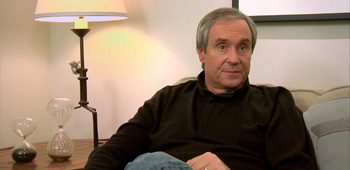
Despite being vilified by many fans, Robert Meyer Burnett looks on Rick Berman as the steward who successfully guided Star Trek through twenty-five seasons and eighteen years of continuous production.
TrekCore: Talk to us a little bit about the structure of your documentaries. I read one review which perhaps unfairly stated that the documentaries are arbitrarily divided into their individual parts. Do you have limits put on you for how long each “feature” can be?
Robert Meyer Burnett: No, not really, and I’m sorry to hear that, because I thought that the structure of the documentary… especially in Season One, you know the first thirty minutes deals with the inception of the show, and we have literally everybody that was alive and would talk to us that was there from the beginning, leading up all the way to the casting of Captain Picard. Then we have the actors join us in Part Two; then in Part Three we brought in even more people to talk about the visual effects and the actual production of the show. I think that’s sort of an unfair assessment. I mean, we spent a long time thinking about the structure of these documentaries.
The Season Two documentary – I really thought, once we started cutting it, we needed perspective. We needed somebody to comment on, ‘What was Season One like?’, and that’s why we brought in Larry Nemecek and Mark Altman and Dan Madsen who, arguably, at the time, were the three guys – as journalists, and as authors, covered Star Trek from the fans’ perspective, and from a documentarian’s perspective. Mark Altman’s articles for Cinefantasique were definitive; Larry wrote the Star Trek: The Next Generation Companion; Dan covered the show as the president and publisher of the Fan Club magazine. To me, to have those three guys was essential – and then to hear other people’s perspectives, such as Patrick Stewart and Rick Berman…essential.
Angelo Dante at CBS found that clip from Entertainment Tonight which begins the doc, and just coincidentally happens to have both Denise Crosby and Gates McFadden, two women who didn’t come back! I was thinking, from a storytelling standpoint, “That’s golden!” You have the two of them that Entertainment Tonight chose to put in their story about the wrap party of the show at the Griffith Park Observatory, not realizing not only had Denise already left, but Gates was to be let go the following day.
The problem is this: the fan community is always coming at it with what they want; what they think should happen. They never look at things as they are. It was the same thing that happened with Free Enterprise. A lot of people wanted the “Get a Life!” speech – the Shatner speech from Saturday Night Live – turned into a feature film. They rejected Free Enterprise because of the sexual content and because of what it wasn’t, as opposed to what it was. There’s nothing arbitrary at all about our documentaries. Roger and I discuss the content extensively before we even begin.
People would say, like, “Okay, then, why do you get one guest star, the guy who played Klag – Brian Thompson – why would you get him to be in your documentary and not any other guest star?” Well, we were able to get him! At the time, we were able to schedule him! It’s not like we’re not trying! I mean, we tried to get Suzie Plakson; we’re trying to get other people; we’re thinking about this. For Enterprise Season One I called Jeffrey Combs and said “We can’t do it without you!” and he’s like, “Great!” You know, we’re trying to cover all of our bases. It’s just a question of time and scheduling. Jeffrey came in a did a terrific interview for season two.
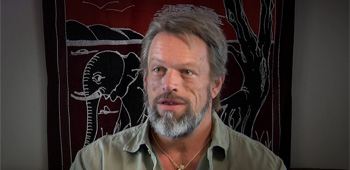
For Season 2, Robert Meyer Burnett was able to interview guest star Brian Thompson. On the outset it may seem like a random choice, but as Burnett explains – both he and Roger Lay are doing their best to schedule as many guest stars as possible.
TrekCore: Your style of documentary filmmaking, I think, fits The Next Generation especially well. The stories behind the camera are very often as interesting as the episodes themselves, but there’s a huge challenge of documenting a show in such detail over a period as long as seven years. It must have been daunting to you, to say the least – how do you even start to formulate a structure for something like that?
Robert Meyer Burnett: I think that’s where Roger and I, our working relationship, is so synergistic in that our documentary styles are the same – we don’t like using a narrator, we like telling a story by intercutting interviews to create a narrative structure, and to reiterate points that are being made. We usually have two or three people making the same point to bring it on home.
We’ll sit down and decide – what is it about this season? What are the things we want to talk about first? With Season One, it was the inception of the show, but it was also the tumultuous nature of the writer’s room, how Gene was rewriting scripts, and things like that; with Season Two, we had to touch on the writer’s strike, the still tumultuous nature of making the show, yet managing to pull through the truncated season.
He and I come up with a basic idea of the outline of the documentaries; then, based on what we do with our interviews, we try – I do not use questions when I do my interviews. At all. We know so much already… I can speak extemporaneously about any aspect of Star Trek because I’ve read every reference book as it’s come out; I own virtually every piece of reference material – official and unofficial – that’s ever been published; if I could have a PhD in anything, it would be Star Trek. So I don’t want to limit myself based on whatever our outline is going to be – I just have conversations with people, and most interviews are two hours long, at least. I just touch on anything; I allow the interviews to be guided by what my interview subject has to say. Sometimes, when they tell certain stories, we know we’re going to use those in the documentaries – like Diana [Muldaur] saying she hated her uniform, and there’s that great bit from “Where Silence Has Lease” where her body is controlled and she does that little crazy dance up against the wall of the bridge. I know that I’m going to use that shot to reiterate that point in the documentary.
TrekCore: With a lot of the actors, though, they must vary in their receptiveness to your questioning. With Star Trek, more than any other franchise, there’s often a huge amount of fatigue that’s hard to break through with these guys; sometimes they’ve been doing it for forty years. How do you make that connection with them?
Robert Meyer Burnett: Well, I learned a secret in my previous DVD documentary work – I’ll tell everybody the secret of celebrity interviews. You need to show a celebrity that when they’re sitting down to be interviewed for a particular subject, you have to show them immediately that you know something about them beyond what you’ve come to discuss. You need to make an immediate, personal connection with them that shows that you’re not just going to ask some canned questions. They’ve all gone on press junkets; when they go on press junkets they have to sit in a room all day long, answering different reporters’ questions… the reporters think they’re clever, asking a question for the first time, but the celebrity sits there and answers the same question over and over and over.
What I try and do is disarm a celebrity by asking them a question about something they’ve done that I particularly love – they have to hear the enthusiasm in my voice. It has to be genuine. The very first time I interviewed Patrick Stewart was on the set of X-Men 2, for that DVD. I knew that he might be cantankerous, it could be a good interview or a bad interview – but one of my favorite things that’s ever been on television was the BBC’s version of I, Claudius that he was in. So, before I started asking about X-Men, I said to him, “Mr. Stewart, I have to tell you,” – and even though I’m a fanatical Star Trek fan, I knew I wasn’t going to bring that up – “One of my favorite things ever was I, Claudius. You got to play Sejanus, you got to kill John Rhys-Davies; how awesome was that!?” He just lit up – it showed that I didn’t just look him up on IMDB, but that I could talk about it with the enthusiasm of a fan, and it was something that he did thirty years ago and was particularly proud of. That disarmed him, and once he knew that I wasn’t just some idiot reporter reading notes, he wanted to talk to me.
That’s how I try and talk to everybody. I don’t want to ask Frakes “Tell me about Commander Riker. Tell me about that story.” I mean, Jonathan Frakes is a really smart, very funny, articulate guy who now has an incredible television directing career. The last thing in the world I’m going to ask him is “Tell me about Riker.” Come on. When you have somebody who is that smart and who has had that interesting of a career, I want to know about that. I want to have that kind of a conversation. One of the great things you’ll see in later seasons is how the actors went to “Star Trek University”, LeVar and Jonathan. Rick Berman made Jonathan go through the motions for a year before he was allowed to direct. Berman would always say to him, “Have you given up your dream of directing yet?” and it was Jonathan’s wife, Genie Francis, who said, “Don’t give up – [Berman] wants to see how committed you are.” Those are the great stories, and that’s how you approach these interviews.
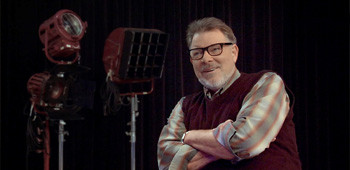
Burnett takes a disarming approach when interviewing the likes of Jonathan Frakes which often results in some wonderful previously untold stories coming to light. Frakes’ recollection of going to “Star Trek University” to study directing was one of many gems to come out in the bonus features.
I saw something a long time ago, at the premiere of the first Tom Cruise Mission: Impossible film, I remember seeing the MTV VJ ‘Kennedy’ interviewing Martin Landau on the red carpet. She asked him “What brings you here to this premiere?” Of course, Martin Landau was IN the original Mission: Impossible television series! He looked at her, contempt in his eyes, and said something to the effect of, “If you have to ask me that, you shouldn’t be here.” (Laughs) I never wanted to be that dude.
I remember interviewing actor Gabriel Byrne for The Usual Suspects, and the first thing I said to him was, “Dude, you were Uther Pendragon in Excalibur! You rode the dragon in a full suit of armor and got to have sex with John Boorman’s daughter who played Igrayn! How cool was that?!”He just laughed! After I said that, we were off to the races again.
***
ROBERT MEYER BURNETT wrote and directed FREE ENTERPRISE and produced Warner Premiere and Dark Castle’s THE HILLS RUN RED.
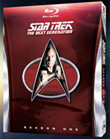 | Order Star Trek: The Next Generation Season 1 Blu-Ray today! | 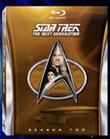 | Order Star Trek: The Next Generation Season 2 Blu-Ray today! |
|---|
